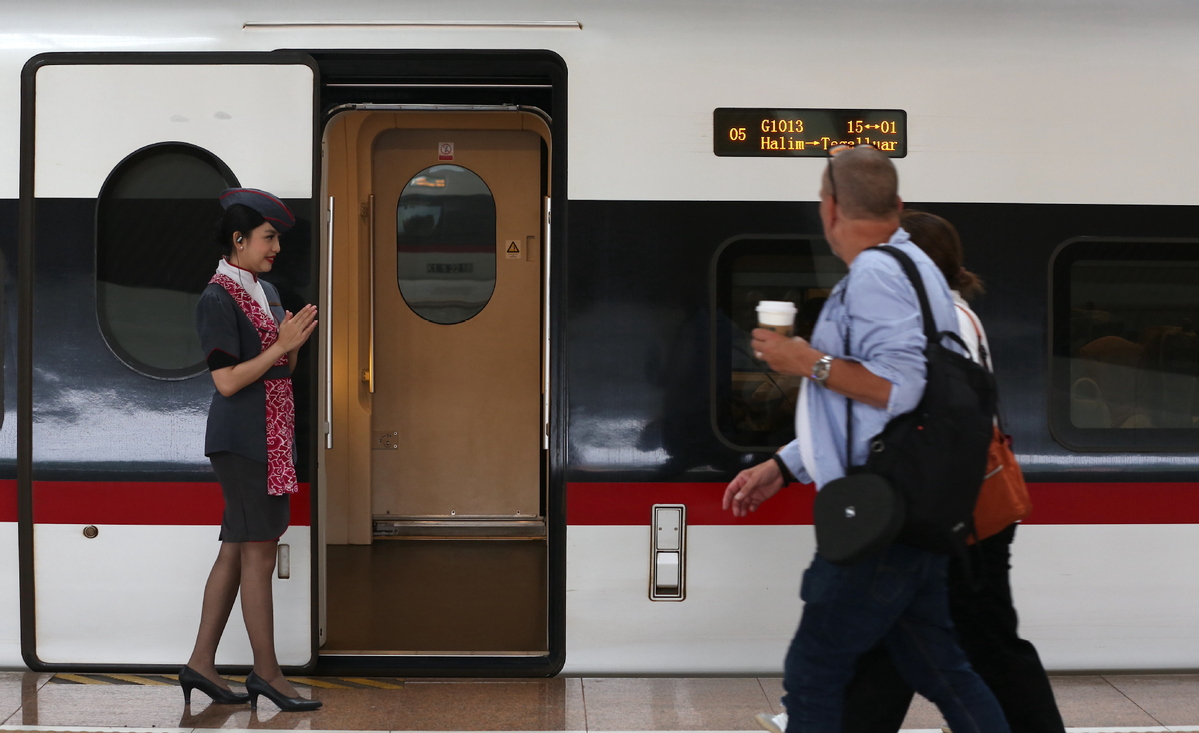
Southeast Asia's first high-speed railway has surpassed 10 million passenger trips as of Wednesday, marking a major milestone in China-Indonesia infrastructure cooperation, according to China Railway International.
Since launching operations in October last year, the Jakarta-Bandung High-Speed Railway has run nearly 30,000 passenger train services, safely covering more than 4.63 million kilometers. The service has maintained stable operations and delivered a fast, efficient and comfortable travel option that has been widely embraced by both commuters and tourists, the company said.
The rail line, a flagship project under the Belt and Road Initiative jointly developed by Chinese and Indonesian partners, links the capital city of Jakarta with the tourism hub of Bandung. With trains reaching speeds of up to 350 kilometers per hour, the line has cut travel time between the two cities from more than three hours to just 46 minutes.
READ MORE: Sino-Indonesian bond grows stronger
Passenger traffic has shown strong growth, especially during major holiday periods such as Christmas and Ramadan, the company said. Daily train services have increased from 14 to 62, boosting seating capacity from about 8,400 to more than 37,000. Peak daily ridership has reached 25,000 trips, with some trains recording occupancy rates of up to 99.6 percent.
The high-speed rail has become a game changer for many Indonesians. Rahmanda, who runs a transportation consultancy in Jakarta, said the service has helped him reach clients on time.
"The punctuality and reliability of the train ensure that I can meet clients without worrying about traffic delays," he said.
To improve the passenger experience, the operator has expanded online ticketing options with flexible refund and rescheduling policies, while maintaining offline counters and offering multiple payment methods. Stations are equipped with fast-food outlets, convenience stores and beverage bars, and onboard amenities include cafes, snacks and facilities for passengers with disabilities.
Operations are managed by the Sino-Indonesian Operation and Maintenance Consortium, which has applied China's advanced experience in scheduling, safety risk management and emergency preparedness. Special protocols have been adopted to ensure operations continue safely during earthquakes, heavy rain and landslides.
A key focus of the project has been localizing operations. More than 600 Indonesian trainees have completed qualification programs, with 263 receiving certification from Indonesia's Ministry of Transportation. Among them, 34 train drivers can now operate trains independently under the guidance of Chinese experts. Another 20 emergency responders and 20 station control staff have also become fully operational.
Agus Dewiono Widodo is one of Indonesia's first certified high-speed train drivers.
ALSO READ: Beijing, Jakarta expand partnerships
"I am proud to be part of this historic achievement," he said, crediting the mentorship of his Chinese colleagues, including high-speed train driver Zhang Yue.
The successful transfer of knowledge and skills has laid the groundwork for Indonesia to independently manage and operate the rail line in the future.
China Railway International said the two countries' railway companies will continue optimizing services and expanding capacity to ensure the Jakarta-Bandung High-Speed Railway remains a reliable and high-quality transportation option.
Contact the writer at luowangshu@chinadaily.com.cn


